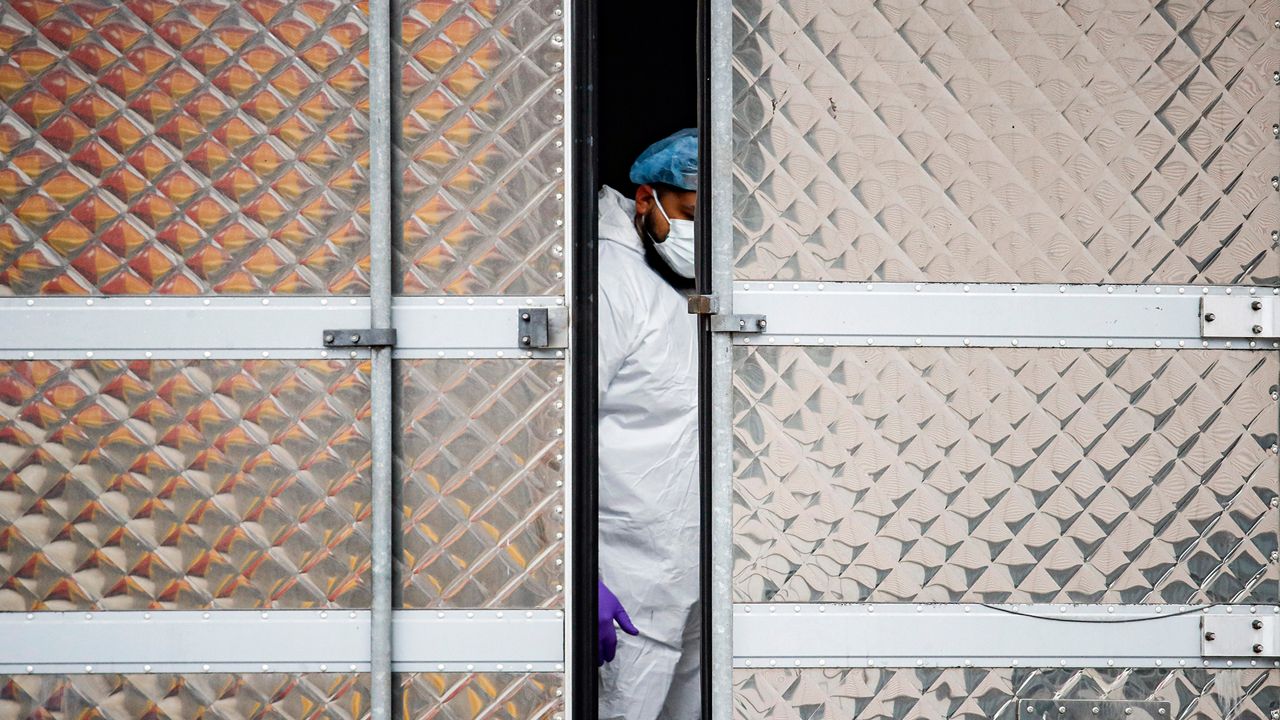COLUMBUS, Ohio — An Ohio hospital recently called in a refrigeration truck for coronavirus victims, officials said Monday as the state passed 5,000 acitve COVID-19 hospitalizations for the first time.
The hospital, which is in the northern part of the state, resorted to the truck when it ran out of morgue capacity, said Dr. Andrew Thomas, Ohio State Wexner Medical Center’s chief clinical officer, and the lead doctor coordinating the response to the pandemic for central Ohio hospitals.
Another rural hospital recently ran low on ventilators and needed to turn to the major central Ohio health systems for assistance, Thomas said. The grim updates were shared during Gov. Mike DeWine's press briefing. The hospitals were not identified.
Ohio reported 6,631 cases Monday, marking another day below the state’s seven-day average of 9,001.9 daily cases.
DeWine said he hopes the numbers are a sign of improvement, though he cautioned the numbers might just be lower because of the weekend.
“We hope these numbers might be coming down, but we just don’t know that yet,” DeWine said.
The state’s testing numbers are still impacted by a backlog in processing thousands of antigen tests that the state puts through a “double checking” process. About three-fourths of those positive antigen tests are typically confirmed.
Asked how residents can assess the state of the pandemic given the asterisks around case reporting, DeWine said “there’s not a massive hole” and added the backlog has dropped to about 7,500 unprocessed positive antigen tests.
Upon guidance from the Centers for Disease Control and Prevention, Ohio will be changing its practices for antigen tests in a few days, DeWine said. After the change, the cases will be added automatically prior to the confirmation process.
According to Monday’s report, 357 more COVID-19 patients were hospitalized and 30 patients died.
There are currently 5,060 patients receiving hospital care, 1,160 in intensive care units, and 682 on ventilators — all of which are records.
Thomas said COVID-19 patients are seriously straining hospitals' intensive care units, where 1 in 3 patients are COVID-19 positive. He said there is concern of COVID-19 patients “crowding out” other patients who need ICU care.
Hospitals are making difficult decisions about delaying elective procedures. Summa Health and UC Health are the state’s latest hospital to announce these emergency measures, announcing Saturday they are halting procedures to avoid overwhelming health care workers.
DeWine shared sad news Monday, reporting the deaths of two correctional facility staffers who contracted COVID-19: Steven Cook of the Dayton Correctional Institution and Mark Jones of Trumbull Correctional Institution.
The state has implemented a 10 p.m. curfew and tightened its mask mandate to combat the surging cases. On Monday, DeWine asked employers reconsider remote work if they have brought employees back in-person. He said state workers will not be returning to offices on Jan. 4 as had been planned.
The governor encouraged residents to pull back, and advised only going out when it is necessary. He said residents should try to limit the number of trips they make to the grocery store. Despite stay-at-home advisories, indoor dining remains open in the state until 10 p.m.
Dr. Anthony Fauci, the nation's top infectious disease expert, said Sunday that bars were contributing to the spread of the virus. "Close the bars and keep the schools open," Fauci said.
Asked if changes were coming for indoor dining in Ohio, DeWine said "I don't have anything to say about that today," and added he has great respect for Fauci. The governor is holding another briefing tomorrow at 2 p.m. at which he could announce new measures to slow the spread of the virus.
DeWine said he was on a call earlier in the day with Vice President Mike Pence that focused on vaccine progress. The governor shared excitement about doses coming to Ohio in the middle of next month. The governor said he would share detailed information on the state’s vaccine plan Thursday.



